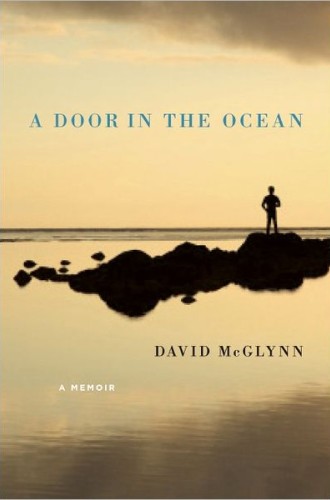A Door in the Ocean, by David McGlynn
In his sparkling new collection of essays—presented as a memoir after some adept editing—David McGlynn wrestles with some of the same fierce angels that haunted his debut collection of short stories, The End of the Straight and Narrow. Both books bear the mark of a serious craftsman; their paragraphs hold the reader with lyric and narrative power.
A champion swimmer, McGlynn found himself adrift as he wrestled with the undertows of adolescence. Before the final failure of his parents’ marriage, McGlynn’s father had offered to return to the family home if his wife would agree to start attending church with him. Having recently had a religious experience with another woman, he wanted Christ to be the center of his family’s life and insisted that his wife become born again. When she refused to take part in what she regarded as her husband’s hypocrisy, it was a deal breaker. And it allowed the straying husband to blame the failure of the marriage on his wife’s recalcitrance.
The divorce of his parents when he was 12 and the murder of his best friend when he was 15—a horrific, inexplicable and unsolved crime—were watershed moments of McGlynn’s formation. Much of this book concerns the author’s efforts to connect the dots between brute happenstance and the meaning of life—an enterprise that revisits the predicament of Job of old. Sometimes the dots just won’t connect; sometimes what is senseless remains steadfast in its senselessness.
McGlynn’s father was a traveling salesman. A while before the divorce, he lost his job in Houston and took work in Southern California, where he had an affair with a woman in his office—an evangelical Christian and former missionary. He proclaimed his love for her and for Jesus and ultimately left his family in Houston for a new life near the ocean and a megachurch. On custodial visits, McGlynn the younger accompanied his father, a kind of born-again Willy Loman, on his rounds:
He was charming, quick with a joke, an ace at talking his way past the receptionist and administrative assistants. . . . He never entered a business without his tie crisp and straight, his breath rinsed with the peppermint oil he kept in the glove compartment.
Between sales calls, McGlynn the elder listened to Rush Limbaugh and Dr. Laura, Chuck Smith and James Dobson, and his son was catechized in right-wing politics and evangelical certainty.
Back in Texas, McGlynn’s mother remarried, his friend’s murder remained unsolved, and he longed for his absent father’s approval. California began to seem like a land of milk and honey, where the magical thinking of evangelical Christianity established an accountancy of good and evil, like the “seed offering” pitches of TV preachers who promised that whatever viewers sacrificed would be returned tenfold. Faith became a kind of ecclesiastical bull market where goodness followed a life lived rightly and bad things happened when one strayed from the straight and narrow.
The son intuited the father’s evidently conditional love:
I was being offered the same choice my father had given my mother a few years earlier: obedience to God in exchange for God’s blessings, his protection from future calamity. My mother had been obstinate in her refusal, strong-willed and stubborn. Now the choice had been passed to me, and I didn’t hesitate to promise God my entire life.
He committed himself to remaining chaste until marriage, voting Republican and spreading the gospel of godly citizenship in trade for his father’s love and for protection from the mayhem and murderous contingencies of life.
A Door in the Ocean gives us a glimpse into the deepening interior conflict of the author’s odyssey—far-flung in both body and soul—from fear-based and triumphalist religious practice to a fundamental and authentic faith, from surety to hope, from a hunger for safety to a willingness to play in the deep end of the pool. There are vexations over theodicy, virginity, gender politics, and sin and sacrifice, and there are multiple Bible study intrigues.
When the author’s fondness for Paul was trumped by doubts over Timothy 2:12 (“I permit no woman to teach or to have authority over a man”), it was a woman in the flesh and in the spirit who led him happily and blessedly astray, into the real world of love and grief even Christians must inhabit. His attachment to Christ became stronger even as his ties to a highly politicized version of Christianity were loosened. McGlynn was able to discern what is essential and what is accessory to faith, what is fundamental and what is mere fashion in rubric and ritual. His book is the well-told story of that discernment.
Readers who have been shaped by the confluence of Ronald Reagan’s trickle-down economics and Jerry Falwell’s Moral Majority—by the arrogance of a bubble-and-bust nationalist and religious chauvinism that claims that God is always on our side—will find in McGlynn’s memoir a reliable witness to their own experience. There is poetry here, as in the Book of Job, but no easy answers or tidy comforts. McGlynn trades glorious and sorrowful mysteries for an adult and hard-won faith in God’s merciful habit of keeping us afloat, even when the worst that can happen happens, as in every life it does.






